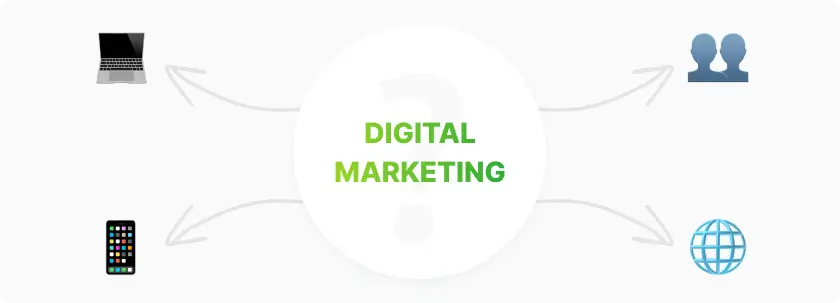
Digital marketing is the backbone of any business. Every owner or manager wants to earn more, and digital marketing provides just that opportunity. It provides companies with targeted customers through digital channels, i.e. technologies for sharing information on the Internet. For example, search engines, social media, email, mobile apps, videos, etc.
Definition of digital marketing
Digital marketing is a set of marketing activities aimed at promoting products or services via the Internet and other digital channels. It encompasses a variety of strategies and tools that allow you to engage and interact with your target audience in real time.
Key Features of Digital Marketing
- Real-time interaction: online marketing allows you to respond instantly to user actions and interact with them in real time. This allows you to respond quickly to customer requests, increase the level of user engagement, and make it possible to quickly adjust marketing strategies.
- Targeting and personalization: the digital sphere allows you to accurately target your audience based on demographics, interests, behavior, and other parameters. This greatly increases the effectiveness of marketing campaigns, allows you to create personalized content for different audience segments and increase user engagement (offer them exactly what they want).
- Analytics and measurability: digital advertising allows you to collect detailed data on user behavior and campaign performance using various analytical tools. This makes it possible to measure ROI (return on investment), better understand the needs and behavior of the target audience, and optimize marketing strategies based on real data.
- Cross-channel: digital marketing covers various channels, such as social media, email, search engines, mobile applications, etc. This allows you to create integrated and coordinated campaigns. With the help of separation of forces, you can increase the effectiveness of advertising campaigns, contact the target audience on different platforms, and develop your brand online.
- Flexibility and adaptability: digital marketing allows you to quickly change and adapt strategies depending on changes in the market or consumer behavior. This allows you to quickly find the best marketing strategy, improve efficiency, reduce risks, and respond quickly to changing trends and audience preferences.
- Wide reach and global promotion: digital marketing allows you to promote your brand globally and reach audiences around the world. This makes it possible to enter new markets without significant investment, attract more target audiences through the Internet, and increase brand awareness on a global scale.
- Interactivity: digital marketing provides a high level of interactivity, allowing users to interact with content, products, and brands in a variety of ways. This allows you to increase user engagement, stimulate feedback, generate user loyalty, and attract more customers through quizzes, surveys, games, etc.
Types of Digital Marketing
SEO (Search Engine Optimization)
Optimizing a website for search engines to increase its visibility and attract more organic traffic. This includes working on keywords, content, technical aspects of the site, backlinks, and other important elements. Everything is done to make your website as useful as possible for users and understandable for search engines.
PPC (Pay-Per-Click)
Paid advertising on search engines and other platforms where advertisers pay for each click on an ad. This allows you to quickly drive traffic to your website and control advertising costs. PPC advertising can be in different forms: search engine results, banners on third-party sites, video ads, Shopping Ads, etc.
Content marketing
Creation and distribution of useful and relevant content to attract and retain the target audience. It can be blogs, articles, videos, infographics, and other formats. Information is the most expensive resource, so it is worth its weight in gold, especially in the IT sector.
Social networks
Use social media to promote your brand, attract customers, and increase loyalty. Social media allows you to actively interact with your audience and create communities around your brand. In the 21st century, this is a very common type of marketing, but unfortunately, people have begun to ignore such advertising, so it is not always effective and requires proper setup.
Email marketing
Email marketing remains one of the most effective digital marketing tools. It allows you to keep in touch with customers, inform them about news and offers, and stimulate repeat sales.
Mobile marketing
Promotion of products and services through mobile applications and websites optimized for mobile devices. This includes SMS campaigns, push notifications, and mobile advertising. Each of us has encountered this type of marketing in our daily lives.
Influencer marketing
Collaboration with influencers on social media to promote a brand or product. This allows you to attract an audience through the trust and authority of influencers. This is a reliable but rather expensive type of promotion, which is also not suitable for every business.
Video marketing
Creating and distributing video content to engage the audience and increase brand awareness. Videos can be posted on platforms such as YouTube, social media, or company websites. This type of marketing is quite effective because people have better visual perception than others, and it can evoke emotions (they have the greatest impact on the decision to buy a product or service).
Development of Digital Marketing

Early stages: email and search engines (1990s – early 2000s)
The first forms of digital marketing appeared with the development of the Internet. Email became the first popular tool for communicating with customers. Later, search engines appeared and changed the way people searched for information. Search engines were also used to implement marketing strategies.
Development of websites and SEO (2000s)
The emergence of more functional and user-friendly websites was an important milestone. Search engine optimization (SEO) became critical for driving organic traffic and developing other types of marketing.
Development of social networks (2000s – early 2010s)
Social media became a new channel for marketing, allowing companies to interact with their audience on a new level. Until then, advertising looked like a simple mailing list, but with the advent of social networks, it turned into a dialog.
Mobile marketing and apps (2010s)
The growth in smartphone usage has changed the way we interact with the Internet, leading to a boom in mobile marketing. With the development of mobile applications, SMS and other elements, marketing became similar to today’s marketing and invented several additional sources of attracting the target audience.
Content marketing and personalization (2010s – present)
With the development of information technology, content marketing has become a key strategy for attracting and retaining an audience, while personalization allows you to create more relevant offers for users.
Artificial intelligence and automation (2020s)
AI and automation technologies are making digital marketing more revolutionary, allowing for more efficient customer interaction (using chatbots) and analyzing large amounts of data.
Conclusion
Digital marketing has become a very important element in the life of any business, as it helps to attract targeted traffic and sell products and services. Digital marketing is divided into many types: SEO, PPC, content marketing, social media, and many others. Creating the right and effective marketing strategy will help you grow your business and enter the global market, so develop your brand and hire the best specialists with HRbanda.














